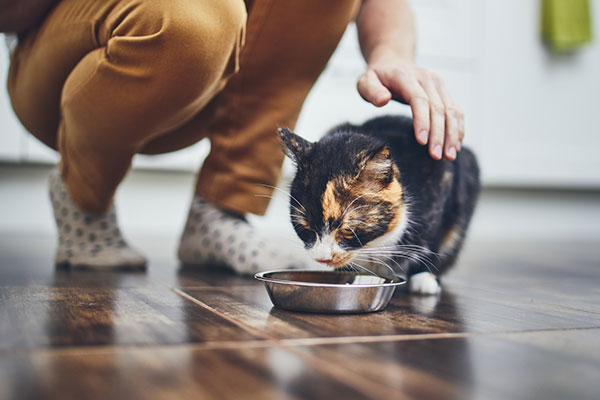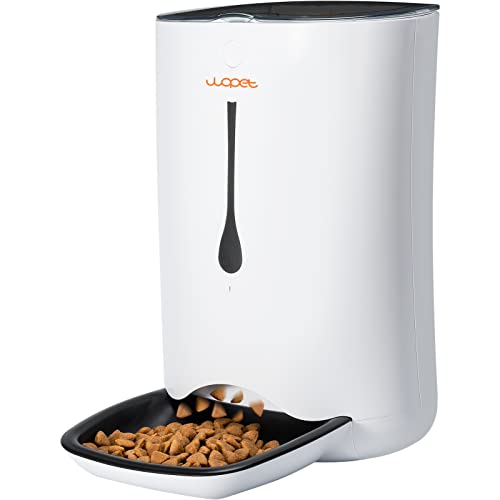Salmon is undeniably one of the most nutritious fish for humans to eat. It’s rich in omega-3 fatty acids, as well as protein and lots of other essential minerals and vitamins.
Salmon is also one of the foods that your cat will find highly appealing, as cats are generally drawn to seafood. But can cats eat salmon?
As strange as it may sound, cats can eat salmon but only occasionally and in moderate amounts. It’s intuitive to think that since cats love fish, feeding them salmon regularly will be beneficial to their health and nutritional needs.
However, the fact that cats love seafood isn’t a license to offer them salmon with careless abandon. Remember that even we humans love pizza and sandwiches. But that doesn’t necessarily make these foods healthy or beneficial for us.
While salmon comes with a cocktail of minerals and vitamins that your cat may benefit from, there are equally inherent dangers to watch out for. Read on as we unpack some of the fundamental things to know about cats and salmon.
Some of the areas the article will cover include the benefits of salmon for cats, potential risks, and the best way to feed salmon to your feline friend.
Table of Contents
Benefits of Salmon for Cats
Many pet owners often wonder to themselves, ‘is it safe for cats to eat salmon?’
As we’ve already indicated, there shouldn’t be any problems feeding salmon to your feline friend occasionally and in moderate amounts. The problem arises when you decide to replace your cat’s regular diet with salmon. Even so, you could be wondering if there are any health or nutritional benefits that your cat will obtain from snacking on salmon.
Here are some of the ways salmon may be beneficial to your cat;
1. Bone and Muscle Development
As you may already know, cats are obligate carnivores. Which means that they can thrive exclusively on a diet of animal protein. Fortunately, salmon happens to be incredibly rich in protein. Therefore, supplementing your cat’s diet with salmon goes a long way in fulfilling the animal’s nutritional needs.
Protein plays numerous essential roles in a cat’s body, including facilitating the development of muscles and bones. Protein also escalates the wound healing process, and can be highly useful for cats that are struggling to heal from physical injury or recover from a surgical procedure.
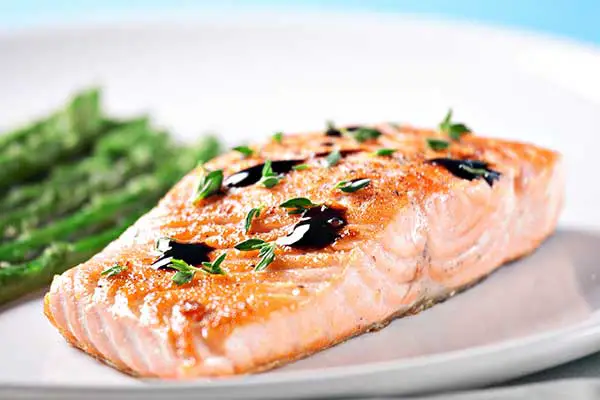
Last but not least, protein-rich foods like salmon play a crucial role in weight management as they tend to increase the metabolic rate.
Another way protein can help to manage your cat’s weight is by inhibiting the functions of appetite-inducing hormones. So, mixing some salmon into your cat’s food will cause the cat to feel fuller for longer.
2. Boosting of Energy
Besides protein, salmon is also remarkably high in B vitamins. In fact, 3.5 ounces (100 grams) of farmed salmon contains all the B vitamins, including;
- Vitamin B1 (thiamin)
- Vitamin B2 (riboflavin)
- Vitamin B3 (niacin)
- Vitamin B5 (pantothenic acid)
- Vitamin B6
- Vitamin B9 (folic acid)
- Vitamin B12
Some of the roles of B vitamins in your cat’s body include synthesis of energy, development and repair of the cat’s DNA, and enhancement of brain function.
- Works as a dog food topper - For pet parents looking for an alternative to capsules, raw treats, or soft chews, all it takes is a...
- A tasty & body nourishing treat for cats & dogs - Essential fatty acids for a healthy coat.
- Powerful Omega Fatty Acids - This premium fish oil liquid formula is loaded with the healthy Omega-3 fatty acid (with epa and dha)...
Last update on 2024-07-09 / Affiliate links / Images from Amazon Product Advertising API
3. Prevention of Disease
Salmon is one of the best animal sources of antioxidants. The fish is rich in the long-chain omega-3 fatty acids – Eicosapentaenoic acid (EPA) and Docosahexaenoic acid (DHA). A 3.5-serving of farmed salmon contains as much as 2.3 grams of long-chain omega-3 fatty acids.
These acids can boost your cat’s immunity by preventing the oxidative stress caused by the presence of free radicals in the cat’s body cells. As such, they could help to keep various chronic diseases, such as kidney disease, diabetes, arthritis, and macular degeneration, at bay.
So, can cats with kidney disease eat salmon? Yes. The omega-3 fatty acids in salmon can be very beneficial for cats with diabetes and kidney disease.
Omega-3 fatty acids are also cited for their anti-inflammatory properties, which could be useful for cats battling inflammatory diseases like cancer. The acids have also been shown to be highly beneficial in reducing the risks of heart disease by lowering blood pressure and improving arterial function.
Besides omega-3 fatty acids, other antioxidants in salmon include astaxanthins. Astaxanthins are antioxidants that belong in the carotenoid family and are the very compounds that give salmons their red pigment. These compounds have been investigated for their ability to lower the risks of heart disease by mediating the effects of LDL (bad) cholesterol while increasing HDL (good) cholesterol.
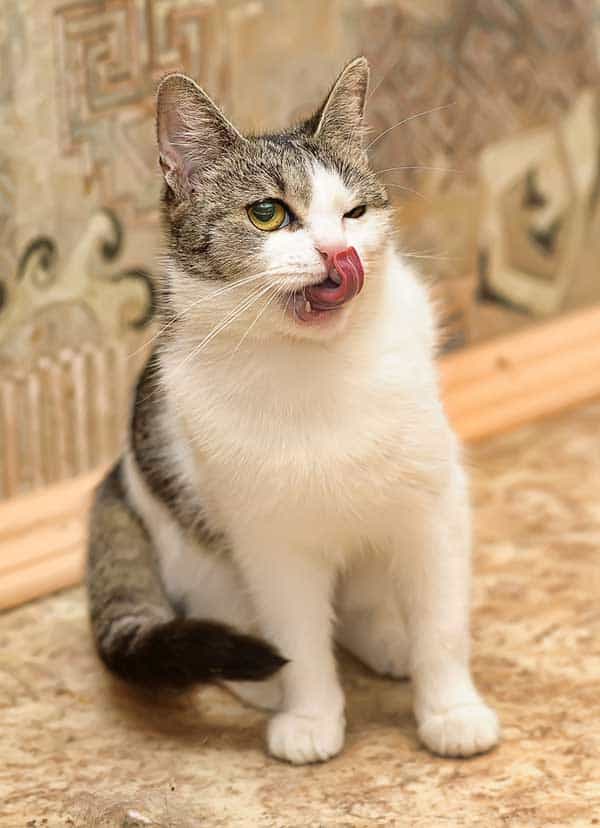
4. Maintenance of Cellular Functions
Salmon is loaded with minerals that improve cellular functions, such as potassium. In addition to maintaining your cat’s cellular functions, potassium also helps to control blood pressure spikes.
Therefore, potassium works synergistically with the other antioxidants in salmon to reduce the risks of heart disease and other blood circulation problems like stroke.
Evidently, there are numerous ways your feline friend will benefit from eating salmon. But the question remains, is salmon good for cats?
The following section shall highlight some of the inherent dangers of feeding salmon to cats, so you can decide whether or not to feed salmon to your cat from a point of information.
ALSO READ: Can Cats Eat Raw Chicken? Health Benefits and Potential Side Effects
Potential Risks of Salmon for Cats
1. Risks of allergy
Much as cats generally love fish, there are always risks of fish allergy to watch out for. Salmon allergy in cats is mostly due to the fact that fish is not part of a cat’s natural diet.
Although salmon is rich in animal protein (the very thing that cats thrive on), most cats are used to protein from beef, chicken, and meat from other domestic animals. In fact, even most wild cats like lions, leopards, and cheetahs generally give fish a wide berth. So, salmon is to cats what game meat is to humans.
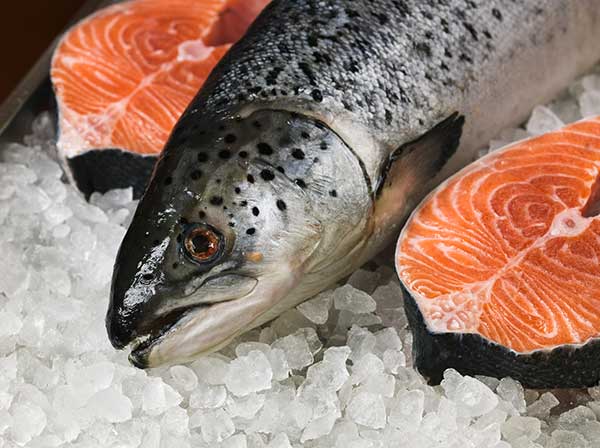
The following are some of the symptoms that suggest your cat is allergic to salmon;
- Gastrointestinal distress, including nausea and vomiting, diarrhea or constipation, and abdominal pain.
- Dehydration symptoms, which result from vomiting and diarrhea.
- Runny eyes and nose.
- Incessant coughing, sneezing, or wheezing.
- Too much vocalization.
- Irritable behavior.
- Skin rash, which causes itching all over the body.
2. Salmon still doesn’t provide your cat with all of her nutritional needs
As strange as it may sound, salmon lacks all the nutrients that your cat requires. While it’s loaded with protein, B vitamins, and long-chain omega-3 fatty acids, salmon doesn’t provide your cat with enough of the essential amino-acid, taurine.
Taurine is such an essential mineral for cats that a deficiency could cause blindness and a host of other serious medical issues. Salmon actually contains some taurine. But the little taurine in this fish is often destroyed by cooking.
Other potential risks of salmon for cats depend on how the fish is prepared and other ingredients added to it.
- EASY TO USE, IMPACTFUL RESULTS: Collect a sample, package it up, and send it securely back. Just register, swab, return with the...
- MOST COMPREHENSIVE BREED & TRAIT: Our test distinguishes over 20+ distinct breeds and 50+ trait markers with the most...
- SCREEN FOR 40+ GENETIC DISEASES: Get peace of mind by screening for 64 health markers associated with 43 diseases for which your...
Last update on 2024-07-09 / Affiliate links / Images from Amazon Product Advertising API
What Is The Best Way To Offer Salmon To Cats?
When contemplating feeding any food to cats, there’s always the dilemma as to whether you should offer the food to your feline friend raw or cooked. So, it comes as no surprise that many cat owners often wonder, can cats eat raw salmon?
Proponents of feeding raw foods to pets always argue that doing so allows the animal to enjoy all the nutritional elements that the food contains. Indeed, there’s some truth to that notion, even when it comes to salmon for cats. Remember that we’ve just highlighted how cooking destroys the little taurine that’s present in salmon.
Unfortunately, the risks of raw salmon for cats far outweigh the benefits. As with all seafood, raw salmon contains a host of bacteria and parasites that could lead to food poisoning in cats. The most common ones are salmonella and E. coli. Ingesting salmonella might cause salmonella poisoning, or medically known as salmonellosis.
Some of the symptoms of salmonellosis include;
- Vomiting,
- Diarrhea,
- Dehydration,
- Weight loss,
- Fever,
- Shock, and
- Lethargy
Raw salmon is also discouraged for cats as it contains an enzyme known as thiaminase, which destroys thiamine. Therefore, raw salmon could lead to vitamin B1 deficiency in cats. Thiamin deficiency is one of the worst forms of deficiencies in cats and is associated with nerve damage and vascular injury.
Some of the primary signs of thiamin deficiency include;
- Falling,
- Circling,
- Poor coordination, and
- Dilated pupils
If you must offer raw salmon to your feline friend, ensure that the fish is fresh-caught and served fresh too.
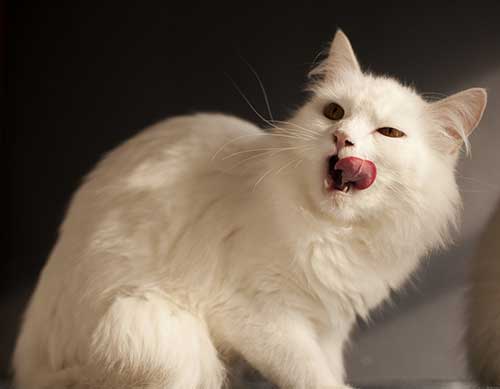
Which leads us to the question…..
can cats eat fresh salmon?
Yes, they can. While raw salmon will likely hurt your cat, feeding her fresh salmon may help to lessen the damage. Otherwise, you’re better off shunning all forms of raw salmon, fresh or stale.
Should cats eat cooked salmon then?
Yes, cats will do better with cooked as opposed to raw salmon. But even then, you must ensure that you cook the fish in a manner that’s considered healthy for cats. While there are numerous ways to prepare salmon, not all of these methods are recommended when you intend to feed the fish to your cat.
Generally, you should cook salmon at a low, regulated temperature. Keep the temperature high enough to destroy any parasites in the fish and low enough to help retain all essential minerals.
Also, avoid adding too much fat, salt, or spices to the fish. While these ingredients are generally appealing to humans, they could spell danger for your feline friend.
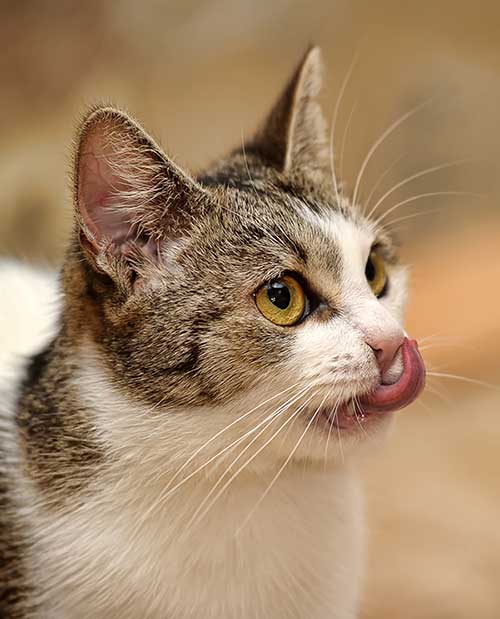
Fatty foods are the leading cause of obesity among cats. Obesity is a risk factor for more severe medical conditions, including diabetes mellitus, hypertension, heart disease, and various types of cancer. And since obesity exerts extra weight and pressure on a cat’s joints, it could also lead to bone issues like arthritis and osteoporosis.
Plus, too much weight makes it difficult for a cat to groom herself, opening her up for a host of skin problems.
Salt is just as toxic to cats as fat is. Excess salt consumption causes sodium ion poisoning in cats.
Some of the signs of sodium ion poisoning include;
- Diminished appetite,
- Nausea and vomiting,
- Diarrhea,
- Fatigue,
- High blood pressure,
- Elevated body temperature,
- Poor motor coordination,
- Anxiety and depression,
- Bladder incontinence, and
- Excessive thirst sensation
In severe cases, sodium ion poisoning could cause seizures, tremors, and coma. And if untreated, death could occur.
Spices, particularly garlic and onion, should also not find their way into any salmon that you intend to feed to your cat. Both garlic and onion cause toxicity in cats, a condition known as Heinz body anemia. The condition causes massive damage to a cat’s red blood cells and manifests in anemia-like symptoms like uncontrollable bleeding.
- FEED YOUR PET WHILE YOU’RE AWAY - Schedule up to 4 automated feedings per day using the built-in programmable timer.Program each...
- CONTROL PORTION SIZE OF EACH FEEDING - Dispense anywhere from 2 teaspoons to 4.5 cups dry food per feeding to sustain any size...
- RECORD A CUSTOM MESSAGE FOR YOUR PET - Keep your pet excited about meal times! Press and hold the mic button for three seconds to...
Last update on 2024-07-10 / Affiliate links / Images from Amazon Product Advertising API
Let’s examine various other methods of preparing salmon and see which one of them is safe for cats.
Can cats eat canned salmon?
Canned salmon contains unhealthy amounts of salt and other additives that make it potentially harmful to cats.
So, can I feed my cat canned salmon? Well, you probably shouldn’t.
Can cats eat smoked salmon?
It’s conventional wisdom that all smoked fish must be cured with salt first. Smoked salmon can contain as much as 700-800 milligrams of salt per 100 grams of fish, which is way too harmful to cats.
Plus, smoked salmon could be laced with toxins in the form of heavy metals. Needless to mention, smoking also rids the fish of moisture.
Can cats eat grilled salmon?
Yes, but only in moderation. Most importantly, the grilled salmon shouldn’t contain any harmful additives.
Can cats eat baked salmon?
Baked salmon is discouraged for cats because it contains lots of dressing, condiments, and spices that cats shouldn’t eat. Plus, the batter itself is nutritionally useless to cats.
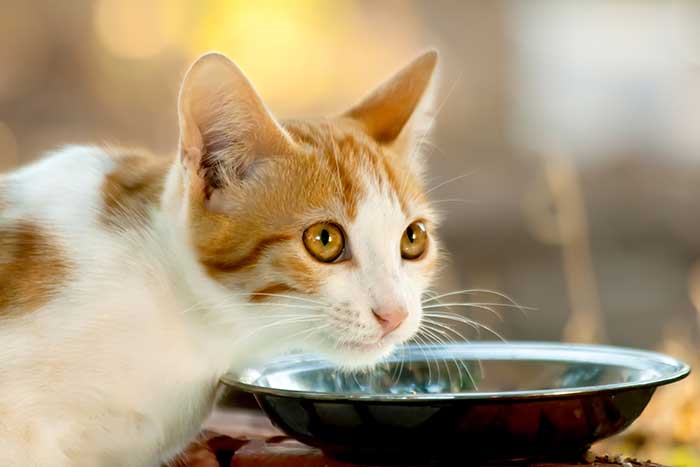
Can cats eat frozen salmon?
Frozen salmon is only safe for your cat if you’ve been able to preserve the fish at temperature conditions below -18 degrees centigrade.
Otherwise, you cannot vouch for its freshness.
Can cats eat salmon sashimi?
The fact that sashimi is made with raw salmon is already enough reason to not feed salmon sashimi to your cat.
Can cats eat salmon jerky?
Salmon jerky refers to salmon that has been cut into strips and dehydrated to prevent spoilage.
While the idea is heavenly, salmon jerky contains low moisture and is usually cured with salt, making it unhealthy for cats.
Besides the method of preparation, there are also concerns relating to the exact part or type of salmon to feed your cat.
Which begs the question….
can cats eat salmon skin?
Yes, cats can eat salmon skin as long as it’s prepared in a healthy manner.
There’s also the issue of bones. But can cats eat salmon bones?
Salmon bones might be hard for your cat to chew. If ingested whole, they could tear your cat’s throat and even choke her. Therefore, it’s prudent to debone a salmon before preparing it for your kitto.
- Real turkey is the number 1 ingredient in this Purina indoor cat food to help provide the protein she needs for strong muscles,...
- High protein cat food kibble with 10 percent less fat than Purina ONE Tender Selects Blend With Real Chicken helps her maintain a...
- A SmartBlend of fiber-rich nutrition in weight control dry cat food helps minimize hairballs, and four antioxidant sources support...
Last update on 2024-07-10 / Affiliate links / Images from Amazon Product Advertising API
What about pink salmon, can cats eat pink salmon?
Now, it’s not unusual to find a cat owner wondering, can I feed my cat pink salmon? Pink salmon, also known as Humpback salmon, is the most abundant type of salmon. The salmon is believed to be incredibly low in fat and comes with a flavorful skin.
While cats can safely eat pink salmon, you’re better off feeding her other types of salmon. That’s because pink salmon tends to be too low in fat and other essential minerals. We’re all intuitively wired to feed our feline friends low-fat foods and that’s perfectly understandable. But with pink salmon, the fat content tends to be lower than the amount experts recommend for cats.
ALSO READ: Can Cats Eat Butter? What You Need To Know!
How Much Salmon Can Cats Eat
There’s no hard and fast rule on the amount of salmon to feed your cat. That depends on various factors, such as the age, size, and general immunity of the cat.
Younger cats shouldn’t eat salmon because their stomachs are highly sensitive to new foods. Therefore, the side effects of salmon for cats are likely to be more severe when it comes to kittens.
So, can kittens eat salmon? The simple answer is, ‘not recommended.’
But if you must feed salmon to a kitten, do so in moderation. Remember, there are still several ways that the kitten will benefit from snacking on salmon occasionally.
When it comes to size considerations, larger cats can consume higher quantities of salmon compared to their small-bodied counterparts. Of course, moderation remains the golden rule here.
Sickly cats can eat salmon if they’re suffering from a medical condition that the fish can help with. However, if the sickness manifests in gastrointestinal distress, then you shouldn’t offer salmon to the cat.
By and large, you should keep the amount of salmon your cat consumes to a maximum of 15% of her regular food.
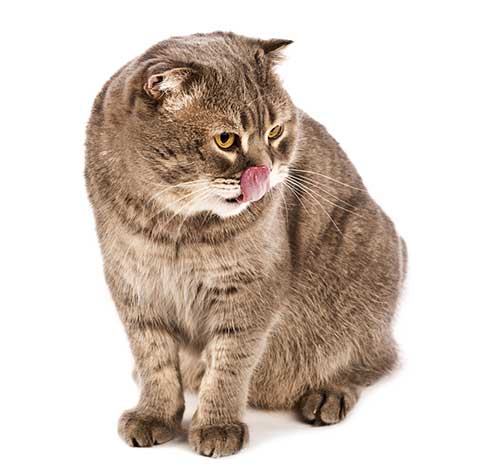
But how often can cats eat salmon? Can cats eat salmon every day?
Cats should definitely not eat salmon every day but as an occasional treat.
Final Word
Cats can eat salmon. In fact, there’s a high chance that your cat will love the fish. Just ensure you avoid feeding raw salmon to your kitto. Instead, opt for cooked salmon. But even so, do not lace the fish with fat, condiments, or spices. Above all, feed salmon to your feline friend only as an occasional treat.
Checkout Our Favorite Cat Products
1. Best Online Course For Cat Parents
Our favorite: The Cat Language Bible (How to Finally Understand And Speak to Your Cat) – A new form of cat to human communication that many cat owners have dreamed about… but few have actually thought possible.
2. Best Vacuum to Tackle Pet Hair
Our favorite: ORFELD Cordless Vacuum – Engineered for homes with pets. With features and tools that dig out dirt, hair and allergens everywhere your pet gets.
3. Best Immune Support For Cats
Our favorite: Tomlyn Immune Support – Best Supplement for Cats and Kittens.

